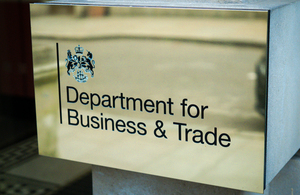Government clampdown on fake reviews and hidden fees to help customers cut the costs of living
A clampdown on fake reviews and hidden fees has been announced by the Government which will help customers cut the costs of living.

- Series of new business measures proposed to boost transparency and help consumers with cost of living as they shop.
- Fake reviews, hidden fees and confusing labels all targeted in new consultations, aimed at improving services for customers.
- New research found three quarters of transport sector have hidden fees in their products, highlighting need for clearer and fairer customer journey.
Consumers are at the heart of new consultations launched later today as the Government commits to improving transparency, fairness and clarity for customers as they shop – including a crackdown on hidden fees in products ranging from train tickets to food deliveries.
Commissioned by the Prime Minister in June as part of the Government’s ongoing work to support people with the cost of living, government research published today will inform the consultation to ensure we root out where ‘drip pricing’ harms consumers most.
The research has confirmed so-called ‘drip pricing’ – where the price paid at checkout is higher than originally advertised due to extra, but necessary, fees – is widespread, and occurs in more than half of providers in the entertainment (54 percent) and hospitality (56 percent) industry, and almost three quarters across transport and communication (72 percent) sectors. In total, this costs UK consumers £1.6 billion online each year.
Minister for Enterprise, Markets and Small Business Kevin Hollinrake said:
Today’s measures will help people keep hold of their hard-earned cash and ensure they have the clearest and most accurate information upfront before they make a purchase.
From the shelves of supermarkets to digital trolleys, modern-day shopping provides a great wealth of choice. But fake reviews and hidden fees can make those choices increasingly confusing and leaves customers unsure about what product is right for them.
We’ll be listening to industry to ensure these new regulations work for businesses too and don’t generate unnecessary burdens, while at the same time providing a crucial safety net for consumers and their cash.
Another consultation launching later today seeks views on measures to stop fake reviews, as initially announced in the Digital Markets, Competition and Consumers Bill (DMCC).
The ambition is to ensure that consumers and traders continue to benefit from reviews that represent a genuine experience, while stamping out the purchase and sales of fake reviews, and ensuring firms take an appropriate level of responsibility for reviews on their websites.
The final consultation launching later today looks at how to simplify labelling on goods.
Following a review by the Competition and Markets Authority (CMA), the Department for Business and Trade has put forward proposals to reform the Price Marking Order (PMO).
The PMO requires traders to display the final selling price and, where appropriate the final unit price (e.g. price per litre/kilogram) of products in a clear way.
These changes will ensure unit pricing is consistently applied, including to promotions and special offers, helping consumers compare products easily and identify what items represent the best value to them.
Sarah Cardell, CEO of the Competition and Markets Authority said:
This consultation follows recommendations from the CMA to government to tighten the rules on how everyday items are priced on supermarket shelves as well as our work tackling fake reviews online.
We’re very pleased to see this getting underway and it’s an important step toward clearer rules and greater transparency for people when shopping around for goods and services.
We’ll feed into this consultation and continue our work in these areas, which we’ll be updating on later this year.
Rocio Concha, Which? Director of Policy and Advocacy said:
The measures being consulted on will address longstanding concerns to help consumers make better informed decisions - whether shopping for products online or buying a weekly shop in the supermarket. Our research shows that fake reviews jeopardise consumer trust and are harmful to honest businesses that don’t purchase or incentivise people to post positive reviews.
Customers also need clear pricing upfront when considering a product or service and should not find themselves having to pay for charges hidden until the checkout like mandatory booking fees. Supermarkets also need to make it easy to compare the unit price of everyday items to help consumers make informed choices during the cost-of-living crisis.
Graham Wynn, Assistant Director for Consumer Policy at the British Retail Consortium said:
The BRC fully supports practical, proportionate consumer protection measures and the level playing field they bring. It is important to keep the rules up to date to reflect changes in buying and selling methods. We look forward to engaging constructively on the proposals.
The Government has already acted to reduce burdens for businesses while ensuring high quality standards for consumers. In August, we announced the extension of the use of CE marking, while also launching a major review into fire safety regulations alongside product safety.
Meanwhile the DMCC Bill, which will look at powers to ban fake reviews, will clamp down on unfair behaviour by a small number of the most powerful tech companies as well as tackling issues such as subscription traps – all with the aims of saving consumers money and boosting competition.
Background:
- The consultation will go live at 10:00 on Monday 4 September.
Last updated 4 September 2023 + show all updates
-
Link to consultation added in body.
-
First published.